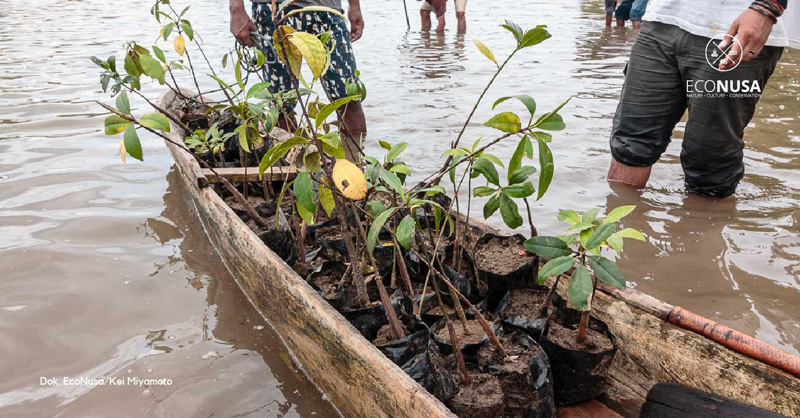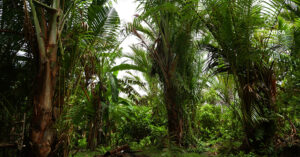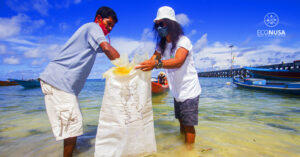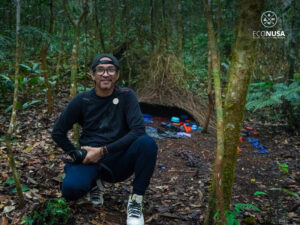
Mangrove ecosystems have an important role in life on earth. Mangroves are the habitat and breeding ground for marine life such as fish, shrimp, shellfish and crabs. In addition, mangroves also provide food and medicine, prevent seawater intrusion, prevent erosion and abrasion, become natural filters and maintain the stability of coastal areas.
Unfortunately, the million benefits stored in mangrove forests do not necessarily make this ecosystem free from threats. Until now, the ecosystem is still under threat from land use change and mangrove clearing.
On a trip to explore coastal villages and small islands in North Maluku, the Maluku EcoNusa Expedition Team stopped at several villages that have mangrove areas, namely Gane Dalam Village and Pasir Putih Village.
In the mangrove areas in these two villages, at least several types of mangroves have been identified, including Rhizophora sp, Bruguierra sp, Avicennia sp, and Sonneratia sp. People used to call mangroves with supportive roots (Rhizophora sp) and knee roots (Bruguiera sp.) As soki. Meanwhile, the mangroves with peg roots (Sonneratia sp) and hanging roots (Avicennia sp) are known as posi-posi.
As people who live on the coast and on small islands, the presence of mangroves plays an important role in their daily lives. The people of Gane Dalam Village, Gane Barat Selatan Subdistrict, South Halmahera, usually take popaco, a type of snail that lives in the roots of soki as a source of protein they consume. In addition, soki leaves are also used as traditional medicine.
“Tong used to take soki leaves. The leaves are boiled and then the tongs are given to drink and shower the woman who has given birth. In order for the body to become strong, the tara feels weak, ”explained Ira, one of the youths from Gane Dalam Village.
Apart from Gane Dalam Village, Posi-posi Village also has an interesting history. The name of the village, which is located in Gane Barat Utara District, South Halmahera, is taken from the local name mangrove. But unfortunately, as far as the eye can see, there is no mangrove cover on the village coast to be found.
Mama Masurya, an elderly resident of Posi-posi Village, said that in the past on the coast of this village there were many mangroves dominated by posi-posi types. Just like the people in Gane Dalam, the Posi-posi people use posi-posi leaves as traditional medicine. Drinking boiled water from leaf sprouts and bark is believed to increase appetite, maintain stamina, and make the body fitter. Unfortunately, the community’s need for these positions has not been accompanied by conservation efforts such as planting. As a result, now there are not any posts there.
Another story is different in Pasir Putih Village, South Kajoa District. Imran Jamal, Head of Pasir Putih Village, said that the people of Pasir Putih Village originally lived in Oda Pos which then moved in 1950.
“There used to be no water. Then the old people used to walk here. There used to be large logs here, then dig it out to find soil. Then please get water and move here, ”said Imran.
Until now, the people of Pasir Putih Village only use soki to cut the wood and turn it into firewood. However, recently these activities have started to have an impact on their survival. Access to clean water is becoming increasingly difficult to obtain. The Regional Drinking Water Company (PDAM) has indeed entered Pasir Putih Village, but it is not sufficient to support the community’s need for clean water. Now, they rely on rainwater for their drinking and bathing water needs.
Another threat faced by Pasir Putih Village is the reduction of land settlements due to abrasion. Yamin Haji Mustafa, a native of Pasir Putih Village, said that the community had to build a small embankment made from concrete and cement to resist abrasion.
Based on observations in the field, most people do not seem to know the importance of the soki and posi-posi ecosystems. This is because people only see these coastal plants as a source of fuel wood and build houses.
While visiting this village, apart from providing health and agricultural services and support, the Maluku EcoNusa Expedition Team together with the PakaTiva Association, WALHI North Maluku, the local community and the community conducted mangrove planting activities in Gane Dalam and Pasir Putih villages. The goal is to encourage mangrove conservation efforts.
The PakaTiva Association through the Forest Community Work program will also invite the community to develop mangrove conservation using the mangrove crab cultivation approach. It is hoped that the community will get economic benefits while preserving the mangrove ecosystem which has an important role in the natural balance of North Maluku.
Editor: Leo Wahyudi & V. Arnila Wulandani




